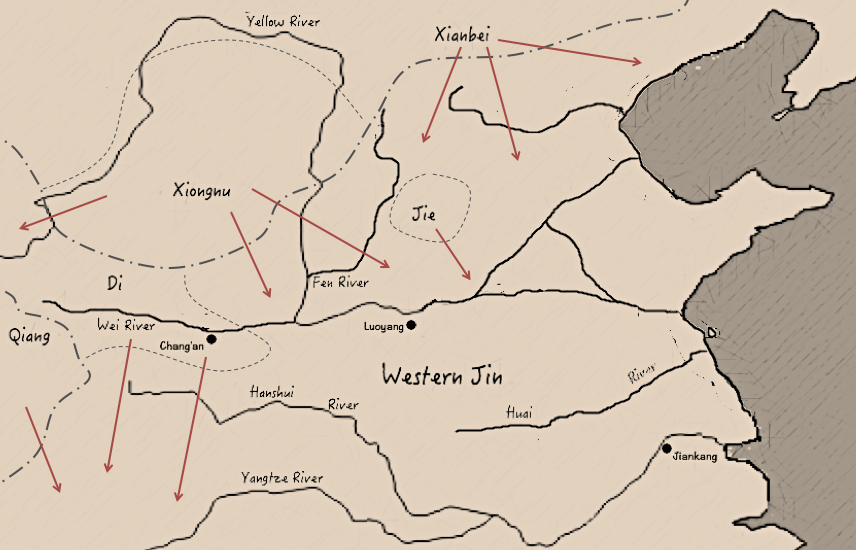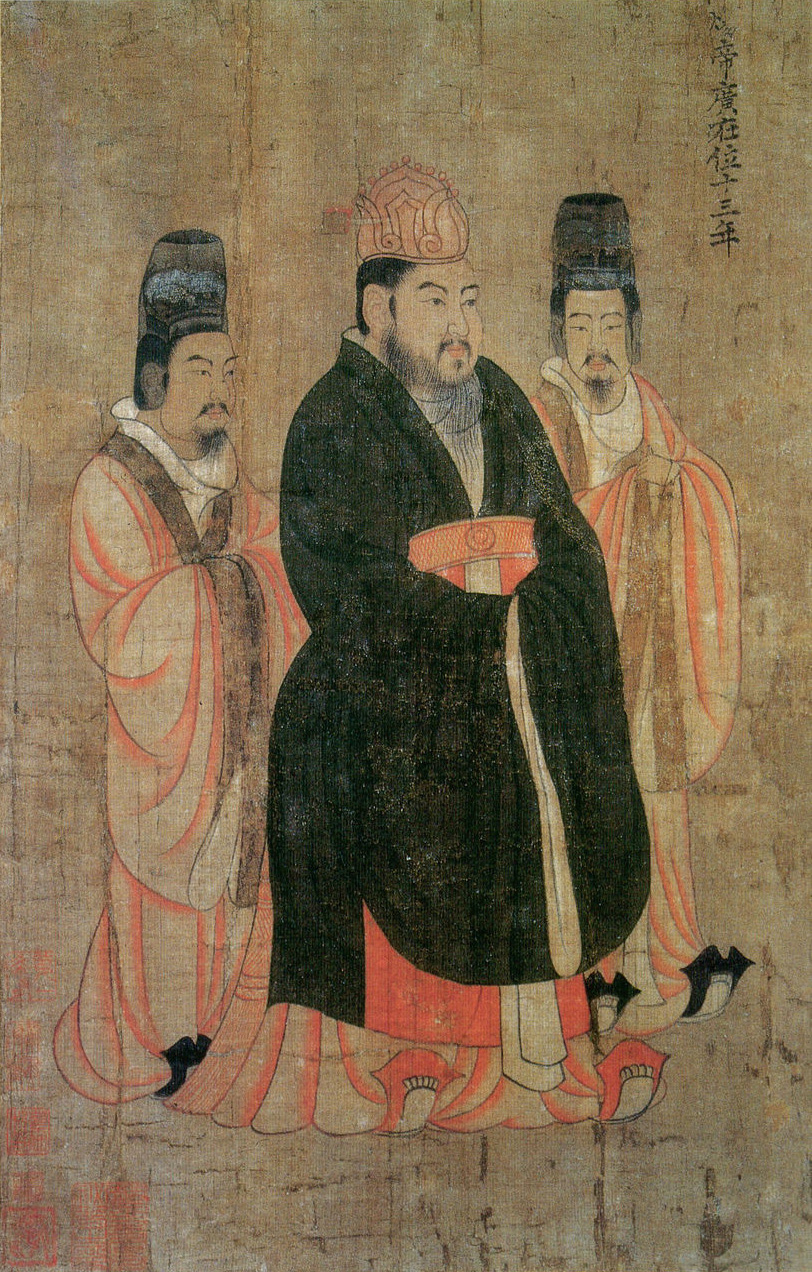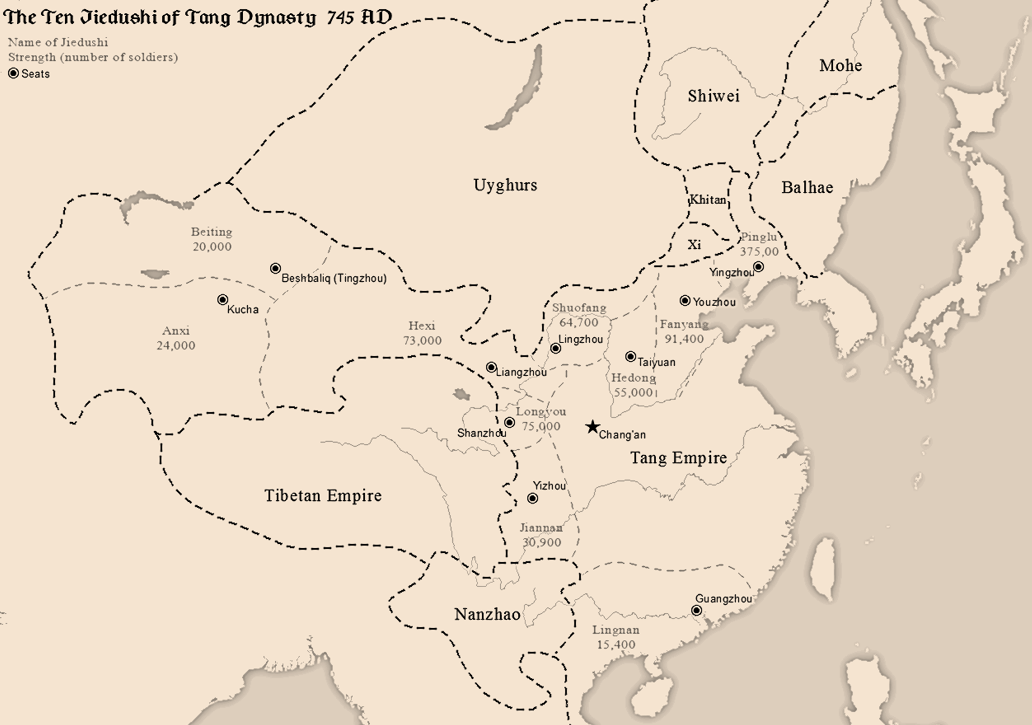|
Du Clan Of Jingzhao
The Du clan of Jingzhao () was a prominent Chinese clan, centred around the Jingzhao region (modern day Xi'an). Tracing its origins back to the Western Han dynasty, it retained its prominence in Chinese politics and society up to the end of the Tang dynasty. History Han dynasty The Du clan can be traced to Du Zhou (d. 94 BC), who served as a censor in the Western Han dynasty under Emperor Wu of Han, and his son Du Yannian, who also served as a chief censor and shifted the clan's base to Duling (in modern-day Xi'an). After this, however, the Du family appears not to be deeply involved in politics during the Eastern Han. Three Kingdoms Period and Jin dynasty The Du family regained prominence in government during the late Han period with Du Ji, who came to the attention of Cao Caovia Xun Yu and became a renowned governor of Hedong Commandery (modern day southern Shanxi). His son, Du Shu, also became a regional governor, and Du Shu's son Du Yu became the chief commander of the conqu ... [...More Info...] [...Related Items...] OR: [Wikipedia] [Google] [Baidu] |
Jingzhao
Jingzhao ( zh, 京兆) was a historical region centered on the ancient Chinese capital of Chang'an. Han dynasty In early Han dynasty, the governor of the capital Chang'an and its vicinities was known as ''You Neishi'' (), and the region was also known by the same name. In 104 BC, the eastern half of ''You Neishi'' was changed to ''Jingzhao Yin'' (京兆尹, "Intendant of the Capital"), while the western half became '' You Fufeng''. The region included 12 counties: Chang'an (), Xinfeng (), Chuansikong (), Lantian (), Huayin (), Zheng (), Hu (), Xiagui (), Nanling (), Fengming (), Baling () and Duling (). In 2 AD, the population was 682,468, in 195,702 households. By the end of the Han dynasty, Nanling, Fengming and Chuansikong counties were abolished and Hu and Huayin became part of Hongnong Commandery, while 5 new counties – Changling (), Yangling (), Shangluo (), Shang (), and Yinpan () – were added from other commanderies. Cao Wei to Sui dynasty In the Cao Wei dyn ... [...More Info...] [...Related Items...] OR: [Wikipedia] [Google] [Baidu] |
Five Barbarians
The Five Barbarians, or Wu Hu (), is a Chinese historical exonym for five ancient non-Han peoples who immigrated to northern China in the Eastern Han dynasty, and then overthrew the Western Jin dynasty and established their own kingdoms in the 4th–5th centuries.''A History of Chinese Civilization'' , Cambridge University Press 1996 P.186-87 [...More Info...] [...Related Items...] OR: [Wikipedia] [Google] [Baidu] |
Du Mu
Du Mu (; 803–852) was a Chinese calligrapher, poet, and politician who lived during the late Tang dynasty. His courtesy name was Muzhi (), and art name Fanchuan (). He is best known for his lyrical and romantic quatrains. Regarded as a major poet during a golden age of Chinese poetry, his name is often mentioned together with that of another renowned Late Tang poet, Li Shangyin, as the "Little Li-Du" (), in contrast to the "Great Li-Du": Li Bai and Du Fu. Among his influences were Du Fu, Li Bai, Han Yu and Liu Zongyuan. Biography Du Mu was born in the Tang capital Chang'an (modern Xi'an) into an elite family, the Jingzhao Du clan, whose fortunes were declining. His grandfather was Du You, a minister at the Tang court and the compiler of the Tang Dynasty encyclopedia ''Tongdian''. He passed the ''jinshi'' ("Presented Scholar") level of the imperial civil service examination in 828 at the age of 25, and began his career as a bureaucrat holding a series of minor posts, fir ... [...More Info...] [...Related Items...] OR: [Wikipedia] [Google] [Baidu] |
Du You
Du You () (735 – December 23, 812), courtesy name Junqing (), formally Duke Anjian of Qi (), was a Chinese historian, military general, and politician. He served as chancellor of the Tang Dynasty. Du was born to an eminent aristocratic family in what is now Xi'an, Shaanxi, almost eighteen years before the abrupt rebellion of An Lushan, and received office for the privilege as administrator of Chi-nan commandery (modernly Licheng District). Robert G. Hoyland considers him a "political thinker on a grand scale," comparable to Ibn Khaldun, but he is most often remembered for his thirty-six year compilation of the ''Tongdian,'' a historical encyclopedia of 200 sections (volumes) collecting laws, regulations, and general events from ancient times to his own. While considering Confucian teachings on the relationship between father and son essential, Du stated that he didn't believe that they provided relevant information for government policy. A legal specialist and authority over s ... [...More Info...] [...Related Items...] OR: [Wikipedia] [Google] [Baidu] |
Du Fu
Du Fu (; 712–770) was a Tang dynasty poet and politician. Along with his elder contemporary and friend Li Bai (Li Po), he is frequently called the greatest of the Chinese poets.Ebrey, 103. His greatest ambition was to serve his country as a successful civil servant, but he proved unable to make the necessary accommodations. His life, like the whole country, was devastated by the An Lushan Rebellion of 755, and his last 15 years were a time of almost constant unrest. Although initially he was little-known to other writers, his works came to be hugely influential in both Chinese and Japanese literary culture. Of his poetic writing, nearly fifteen hundred poems have been preserved over the ages. He has been called the "Poet-Historian" and the "Poet-Sage" by Chinese critics, while the range of his work has allowed him to be introduced to Western readers as "the Chinese Virgil, Horace, Ovid, Shakespeare, Milton, Burns, Wordsworth, Béranger, Hugo or Baudelaire".Hung, 1. ... [...More Info...] [...Related Items...] OR: [Wikipedia] [Google] [Baidu] |
Emperor Taizong Of Tang
Emperor Taizong of Tang (28January 59810July 649), previously Prince of Qin, personal name Li Shimin, was the second emperor of the Tang dynasty of China, ruling from 626 to 649. He is traditionally regarded as a co-founder of the dynasty for his role in encouraging Li Yuan, his father, to rebel against the Sui dynasty at Jinyang in 617. Taizong subsequently played a pivotal role in defeating several of the dynasty's most dangerous opponents and solidifying its rule over China. Taizong is considered to be one of the greatest emperors in China's history and henceforth, his reign became regarded as the exemplary model against which all future emperors were measured. His era, the "Reign of Zhenguan ()" is considered a golden age in ancient Chinese history and was treated as required studying material for future crown princes. Taizong continued to develop imperial examination systems. He asked his officers to become loyal to the policies not people, in order to eliminate corru ... [...More Info...] [...Related Items...] OR: [Wikipedia] [Google] [Baidu] |
Du Ruhui
Du Ruhui (585–630), courtesy name Keming, posthumously known as Duke Cheng of Lai, was a Chinese official who served as a chancellor under Emperor Taizong in the early Tang dynasty. He and his colleague, Fang Xuanling, were often described as role models for chancellors in imperial China. During Sui dynasty Du Ruhui was born in 585, during the reign of Emperor Wen of Sui. He was from the Du clan of Jingzhao, which came from the region around the capital Chang'an. His great-grandfather Du Jiao () and grandfather Du Hui () were both officials for Sui's predecessor state Northern Zhou, and his granduncle Du Guo () or Du Gao () was particularly well-regarded during Sui.It appears fairly clear that Du Hui, not Du Guo/Gao (with "Guo" and "Gao" being two easily confused characters), was Du Ruhui's grandfather, but not completely. Du Ruhui's biography in the ''Old Book of Tang'' first said that Du Hui was his grandfather, and then said that Du Guo was his grandfather. See ''Old B ... [...More Info...] [...Related Items...] OR: [Wikipedia] [Google] [Baidu] |
Eastern Wu
Wu ( Chinese: 吳; pinyin: ''Wú''; Middle Chinese *''ŋuo'' < : ''*ŋuɑ''), known in historiography as Eastern Wu or Sun Wu, was one of the three major states that competed for supremacy over in the period (220–280). It previously existed from 220–222 as a kingdom nominally under , its rival state, but declared independence from Wei and became ... [...More Info...] [...Related Items...] OR: [Wikipedia] [Google] [Baidu] |
Western Jin Dynasty
Western may refer to: Places *Western, Nebraska, a village in the US *Western, New York, a town in the US *Western Creek, Tasmania, a locality in Australia *Western Junction, Tasmania, a locality in Australia *Western world, countries that identify with shared "Western" culture Arts and entertainment Films * ''Western'' (1997 film), a French road movie directed by Manuel Poirier * ''Western'' (2017 film), a German-Austrian film Genres *Western (genre), a category of fiction and visual art centered on the American Old West **Western fiction, the Western genre as featured in literature **Western music (North America), a type of American folk music Music * ''Westerns'' (EP), an EP by Pete Yorn *WSTRN, a British hip hop group from west London Business *The Western, a closed hotel/casino in Las Vegas, United States *Western Cartridge Company, a manufacturer of ammunition *Western Publishing, a defunct publishing company Educational institutions *Western Washington University i ... [...More Info...] [...Related Items...] OR: [Wikipedia] [Google] [Baidu] |
Cao Wei
Wei ( Hanzi: 魏; pinyin: ''Wèi'' < : *''ŋjweiC'' < : *''ŋuiC'') (220–266), known as Cao Wei or Former Wei in historiography, was one of the three major states that competed for supremacy over China in the period (220–280). With its capital initially located at , and thereafter |
An-Shi Rebellion
The An Lushan Rebellion was an uprising against the Tang dynasty of China towards the mid-point of the dynasty (from 755 to 763), with an attempt to replace it with the Yan dynasty. The rebellion was originally led by An Lushan, a general officer of the Tang military system. The event involved military activity and direct deaths from battle, but also significant associated population loss from famine, and population dislocations. The event is also known, especially in Chinese historiography, either as the An–Shi Rebellion or as the An–Shi Disturbances (). The use of the term ''luàn'' ("chaos") indicates the extreme social instability and population loss which eventually resulted, far beyond the initial consequences of the rebellion. Traditionally, Chinese family names have begun with the family name first. In this case the family name of the initial rebel leader is An. The term ''Ān-Shǐ'' is used to recognize that the rebellion continued after An Lushan's death, with the ... [...More Info...] [...Related Items...] OR: [Wikipedia] [Google] [Baidu] |
Tongdian
The ''Tongdian'' () is a Chinese institutional history and encyclopedia text. It covers a panoply of topics from high antiquity through the year 756, whereas a quarter of the book focuses on the Tang Dynasty. The book was written by Du You from 766 to 801. It contains 200 volumes and about 1.7 million words, and is at times regarded as the most representative contemporary texts of the Tang Dynasty. Du You also incorporated many materials from other sources, including a book written by his nephew, Du Huan, who was taken captive in the famous battle at the Talas River between Tang and the Arabs in 751 and did not return to China until ten years later. It became a model for works by scholar Zheng Qiao and Ma Duanlin centuries later. Robert G. Hoyland relates that the ''Tongdian''s first draft was a "history of human institutions from earliest times down to the reign of Emperor Xuanzong of Tang", and was subsequently revised as matters continued to evolve. It incorporates parts of the ' ... [...More Info...] [...Related Items...] OR: [Wikipedia] [Google] [Baidu] |




.jpg)
